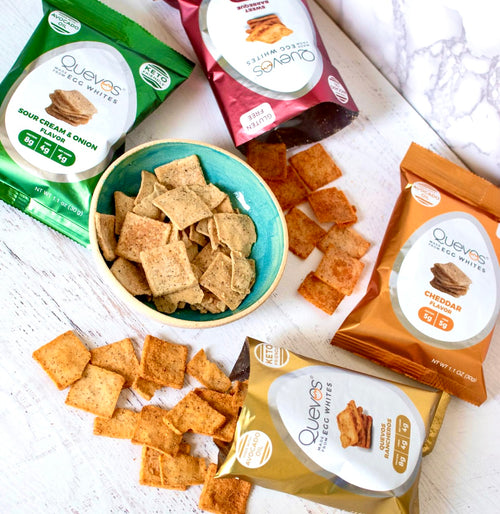You’ve just started out on a low-carb diet. You know the basics: stick to proteins and fats, and keep your carb intake at bay. It seems simple enough -- until your snack choices whittle down to a cheese stick and you never feel totally full. When all carbs become the enemy, an already-restrictive diet or lifestyle may feel close to impossible. Luckily, there’s a “hack” in the system (your digestive system, that is) that promotes fullness and lets you sneak in extra carbs -- without cheating on your diet at all. Meet your new low-carb best friend: fiber.
Carbohydrate 101: Why Net Carbs Matter

Let’s go back to the basics. Carbohydrates are one of the three macronutrients that make up all of the food you eat, along with protein and fat. The category as a whole includes starches and sugars, foods made up of one (simple) or several (complex) sugar molecules.
While foods like candy and sweet potatoes are all put together in the same category, your body processes them very differently. This is because some carbs are broken down into sugar in your small intestine, but others can’t be fully digested by your body at all. The latter category is a group of carbs (sugar alcohols or fiber) that won’t spike your blood sugar or throw off your weight loss journey. Because of this, they can be subtracted from total carbs when tracking your intake -- if your body isn’t recognizing them, you shouldn’t have to either. The new total (total carbohydrates - non-breakdownable carbohydrates) is referred to as net carbs, aka the only carbohydrates that your body actually digests.
When on a low-carb diet, this number is the only number you should care about. Consider it your trusty hack in navigating carbs. Some food brands will do the work for you and display net carbs on the packaging. Other nutrition labels will require you to put on your 4th-grade math cap and do some good ol’ subtraction -- but that feeling of genuine, guilt-free fullness will be worth it every time.
What’s the Deal with Fiber?

Image Credit: @ketocoffeeandlipstick
You may be wondering how this equation even makes sense. After all, fiber is a carb. But unlike starch or sugar, fiber isn’t actually absorbed into your small intestine. Fiber is a complex carb unit that isn’t able to be broken down in your digestive tract, even with the help of carb-breakdown enzymes. Instead, fiber passes directly to the colon, where it slows the digestion process overall and helps keep you full. In other words, fiber never breaks down to sugar like other carbs. Thus, it shouldn’t be counted as a sugar for either dietary restrictions or tracking your blood sugar.
Finding a Friend in Fiber

Image Source: Unsplash
If anything, fiber -- particularly soluble fiber -- actually provides a number of health benefits. In the gut, soluble fibers are fermented into short-chain fatty acids (SCFAs) which actually help with gut health. In fact, they’re the main source of nutrition for your colon cells. They have been shown to reduce the risk of inflammatory diseases, type 2 diabetes, and obesity.
Some examples of soluble fiber are found in oat bran, lentils, fruits, and chicory root -- the source of fiber in Quevos chips that aids in blood sugar control and contributes a whopping 4 grams of fiber per serving.
What’s particularly exciting about soluble fiber is that it doesn’t just bypass the carb count; it actually aids the gut in reducing blood sugar levels. Multiple studies have proven that soluble fiber can lead to overall better blood sugar control, increased insulin sensitivity, and the absorption of fewer calories. This means that someone with diabetes can also safely factor net carbs, rather than total carbs, to guide their insulin intake. A huge snack-lover win.
The takeaway? Whether you’re on keto, Atkins, or you have to track your blood sugar levels, you don’t have to restrict yourself to nuts and cheese for your midday snack. Instead, look out for fiber and calculate those net carbs -- not just for an accurate understanding of your carb intake, but more importantly, to actually aid your body in its fight against sugar.


